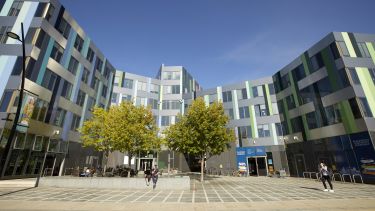FAQs
Below are answers to frequently asked questions about undergraduate admissions.

If we haven't answered your question, or you would like to discuss anything else with us, please get in touch.
- What would you want to see in a personal statement for languages?
-
Above all we would like to see a personal statement that is just that: personal. Weâre interested in what draws you specifically to languages, what inspires and motivates you about learning and studying a foreign language or languages â a particular experience abroad, someone you know or met, a novel, film, artist or song, a teacher who enthused you, the sound of the language, the history of a country or people, etc. Weâre also interested in how you engage with your languages, e.g., by close reading, listening to the radio, singing along on Youtube, watching films, volunteering, political engagement, online chats, travel, cooking, and so on.
And please let us know not just what you do with languages already but what new or different languages you might want to pursue at 91ÖḟĠċ (e.g., Dutch, Czech, Catalan) and why, and what you might want to do with your languages in the future, possibly linked to your language-learning.
- Do I need to specify my chosen language(s) on my UCAS form?
-
No - there is no need to specify your language(s) on your application. Your choices will be confirmed before the start of the first semester.
- Are there any recommendations of resources we should look at during A-levels, such as books or articles?
-
Maybe not specific recommendations, but certainly a strong encouragement to read widely and listen often to the language, building it into your daily or weekly routines. We also post on our language webpages the reading lists for core first-year modules. So please take a look at these and start exploring what weâll be studying together.
- It says entry requirements are ABB, does the A have to be in the A-Level language(s)?
-
No. The âAâ grade can be in any of your A Level subjects.
- Does the Extended Project Qualification (EPQ) affect entry requirements?
-
Yes. Provided you get a âBâ grade in your EPQ, it allows us to make you an offer reduced by one grade, for example, BBB instead of ABB. The subject of your EPQ is not a determining factor, since we appreciate the independent research skills that the qualification gives you. However, if the topic is language-related or deals with foreign cultures, it clearly strengthens your profile for our degree programmes.
- If you chose to study a language which is totally new to you, are you expected to have any knowledge of it before you start learning?
-
At 91ÖḟĠċ, Beginnersâ languages mean beginners. We do not expect you to have any prior knowledge of any language that you pick up with us from Beginnersâ level. Having said that, it obviously helps, given the intensive nature of Beginnersâ language programmes, if you are able to engage with the language in some way before starting it, e.g., learning the sounds on Youtube, reading about its linguistic particularities and so on.
- Will you reach the same level of fluency in a beginner's language as a post A-Level language?
-
The short answer is yes, but this depends on you. Your Beginnersâ language is taken intensively in first and second year in a separate stream from the post-A-Level students of that language. This is to prepare you as fully as possible for the year abroad. On the year abroad, the progress in language proficiency that you make is entirely down to your immersion and involvement in the language and culture of your host country. In your final year, as a post-Beginner, you will normally be in classes with post-A-Level students. We expect all of our students â post-Beginner and post-A-Level â to reach a C1 advanced independent proficient language-user level (i.e., fluent!) if they have spent time in the country of that language during their year abroad. There is no difference here between those who started the language from scratch and those who already had an A-Level in it. In fact, experience teaches us that some Beginnersâ students build rapidly on their enthusiasm and momentum in a new language and end up surpassing their post-A-Level peers in final year.
-
If I start with two languages would I be able to drop one after a year if I find it too difficult?
-
Yes, you can drop one of your languages if you find the combination too difficult. You can do this in the first three weeks of your first year or at the end of your first year. This applies, regardless of whether you have taken the language in question at A-Level or have picked it up as a Beginner with us.
- Could you learn two languages if youâre planning to do a dual degree with a non-language?
-
At 91ÖḟĠċ you can learn two languages alongside your non-language subject, for example, French and Spanish and History. So you apply for the Dual degree combination of, say, History and BA in Modern Languages and Cultures. You then decide on the number and combination of languages with your non-language subject when you arrive in 91ÖḟĠċ. It is very common for students on these Dual programmes to start one of their languages at Beginnersâ level.
- Does this mean you effectively have one major and one minor language in a Dual degree with a non-language subject?
-
Most of these Dual degrees combining two languages with a non-language subject are taken in the proportion of 60 credits non-language (e.g., History), 40 credits in Language 1 and 20 credits in Language 2. So this 60/40/20 split is effectively like taking a Major language (40 credits) and a Minor language (20 credits) through the degree programme. However, with Dual subjects in the Faculty of Arts and Humanities, there is further flexibility, since you can also balance out your credits between your three subjects, and so have 40 credits (e.g., History), 40 credits Language 1 and 40 credits Language 2. We call this the 'triple option'.
- Where do lectures take place?
-
Our lectures, seminars and language classes take place across the campus, although most are based around our home Jessop West site. There are also very good âhubâ and seminar rooms in Jessop West itself in which we teach small language and content classes. We are in the same building as our English and History Dual departments; other Dual departments are near-by, such as Music and Philosophy. Some are a bit further afield, which is the case for Economics or Politics. However, the campus is compact, so you are never more than 10-15 minutes away from your other Department. The best way to get a sense of this is to visit us on an open day!
- What are the options regarding also studying an East Asian language such as Korean or Japanese?
-
At present you cannot study an East Asian language, such as Chinese, Korean or Japanese, with one of the School of Language and Cultureâs 10 languages. You can, however, study East Asian languages as a guided module choice through the University-wide Languages for All programme. This particularly applies to your first year of studies. Please see the Languages for All website and School of East Asian Studies website for further details.
NB: The School of East Asian Studies (Chinese, Japanese, Korean Studies) has recently joined the Faculty of Arts and Humanities. So we hope to develop Dual language programmes with them in the near future. Please keep an eye on our web pages for any developments on this front.
- Are the modules taught in the target language or in English?
-
Language of teaching varies between subjects and levels. But, as a rule of thumb, language learning is usually taught in the target language, except for some exercises like translation into English or for explanation of grammar points. Culture modules are taught in either the target language or English, depending on the subject matter, but all programmes offer some culture module teaching in the target language. This tends to increase in final year.
- How are language courses assessed?
-
Language courses are assessed by a wide range of means: oral debate classes, individual and group presentations, translations, comprehension exercises, compositions (critical essays), grammar quizzes, etc. We aim to strike a balance between formal, constructed forms of language work and more spontaneous, improvised activities.
- What are the class sizes like? Do you record lectures?
-
There are on average between 16-19 students in our language classes. We have a maximum of 23 students in a class for language work. But the oral language class is usually smaller so that it can be used for more intensive oral work or other small-group activities. Class size can rise to 25 for seminars in culture modules. The only large-group lectures take place in first year; there can be between 30 and 70+ students in these lectures. Lectures are recorded, but seminars usually are not recorded.
- What resources do you have to practice languages?
-
We have language lab facilities in 301 Glossop Road, a purpose-built learning support and self-study centre. Our students are very active in language-based volunteering activities. We also draw on the many exchange students studying in 91ÖḟĠċ who take part in tandem-learning exchanges with our students, or they get involved in many of the language-based activities organized by our engaged and enthusiastic student language societies, e.g., concerts, plays, language walks in the Peak District, trips abroad, food evenings, academic talks by visiting writers, artists and scholars, etc. We are very proud of the distinctive and dynamic language communities that we build around our language programmes.
- What sort of topics can we study for the optional modules?
-
The range is vast. We have particular expertise in optional modules dealing with post-colonial languages and cultures in the Caribbean, Latin America, north and West Africa, and Eurasia. But we also offer modules spanning centuries of European culture from the Enlightenment to today. The subjects studied include literature, art, society, linguistics, music, politics, and philosophy. As a result, you can usually map out a pathway in a given subject area (e.g., cinema or history) across your languages and across the years of your degree, if this is what you want to do.
-
Some of the modules on the website are available in multiple years of the degree. Once you've chosen a module in one year is it then unavailable to take later?
-
Modules offered to multiple year groups (usually second- and final-year students studying together) tend to occur in languages with fewer students overall, such as Russian or Dutch. Students are usually very receptive to this form of peer-learning and they obviously have differentiated assessments according to the level of their language and culture experience. To avoid the issue of a module being unavailable in final year if it was taken in second year, the choice of these âvertical groupâ modules is often rotated.
-
Do students have the choice of where to go on their year abroad? If you take 2 languages, do you get to choose where you spend your 3rd year?
-
Yes, students have the choice of where they go during the year abroad. The usual choice is between three broad forms of activity: a work/volunteering placement, a university placement, or a British Council teaching assistantship (see below for more on this last option). If you are taking two languages, you not only have a choice of destination for your year abroad placements, but you can also mix up the activities, for example, doing a volunteering placement in Latin America in semester one followed by a university placement in Toulouse or Berlin in semester two.
- What is the support from the university like for the year abroad in Year 3?
-
The School of Languages and Cultures starts to prepare you for your year abroad in your second year with regular information meetings on the choice of destination and placement that you can do, depending on your language(s). We organize meetings between students about to go on their year abroad (second year) and those who have just returned (final year). Students currently on their year abroad also have to write reflective blogs about their year abroad experience which provide valuable âon the groundâ information for the following yearâs students. Both before and during your year abroad, you have a dedicated personal tutor in 91ÖḟĠċ who can be a first port of call for any queries or issues.
- What sort of options are there for the work placements on the year abroad?
-
There are lots of options for work placements. You can volunteer or work in a specific sector (e.g., advertising or hospitality). We keep a database of successful previous work placements and, in many cases, can put you in touch with the students who undertook them. You are also at liberty to seek out your own work placement, although the employer or organization has to sign a âconvention de stageâ contract to confirm that they are providing you with the appropriate opportunities to practise your language and that they are not exploiting you in terms of hours or the type of work done.
- What about accommodation during the year abroad?
-
Accommodation is usually provided by our university partners for university exchanges. For other placements, accommodation may depend on the employer or organization, e.g., if volunteering in a remote area. More usually, it is up to you to find your own accommodation, although, as ever, you will be able to contact other students who have just returned from your chosen destination and ask for their advice.
- How is the year abroad funded?
-
During the Year Abroad, all students are charged reduced tuition fees for the period abroad, with further information available on this webpage. UK nationals who are normally in receipt of funding from Student Finance are still able to receive their tuition and maintenance loans during their time abroad.
Additional funding may be available through the Turing Scheme, which is managed by Global Opportunities & Exchanges. The Turing Scheme is a UK Government funding scheme with an annual application cycle, and therefore is not guaranteed. Students are strongly recommended to plan their finances for their period abroad without this funding.
- Do you have links with the British Council?
-
Yes, like many other top Universities in the UK, we have a long-standing, highly successful relationship with the British Council and many generations of our students have gone on the Councilâs competitive teaching assistantships.
- If you go to a university during the year abroad, what do you learn about while there?
-
On a university placement on the year abroad, you have a choice of modules laid on by the host institution. You can choose either to continue with subjects that you have already studied at 91ÖḟĠċ or you can branch out and try something completely different. Many of our partner institutions have their own specialisms, expertise and range of languages. You can find out about these in the pre-year abroad meetings organized in your second year.
- If you do three languages can you split the year abroad equally? Or can you âdouble upâ, e.g. Barcelona for Spanish and Catalan?
-
The year abroad is usually split between your two main languages (the ones you do most classes in), with one semester in the country of each language of these two languages. For your third language, we encourage you to spend some of the summer months in a country where this language is spoken; or for certain of our languages, we can help you to get into government-funded language summer schools, e.g., Dutch, Czech. Similarly, there is nothing to stop you âdoubling upâ, so you could study Italian in France or Portuguese in Seville, where Italian or Portuguese are your third language. Alternatively, you could go to a work or university placement in a bilingual or even trilingual area, e.g., Switzerland or Luxembourg.
- What are the career prospects for language students? What support is given?
-
Career prospects for modern foreign language students are exceptionally good. For instance, 93% of our graduates were in work or further education six months after graduation for the year 2017-18. 91ÖḟĠċ has a very proactive Careers Service that provides career advice and support throughout your degree, not just at the end of it.
- Where do 91ÖḟĠċ language graduates end up after university?
-
Our languages students go into a raft of different careers and professions, including international institutions (EU, NATO, etc.), civil service, banking, advertising, hospitality, automobile industry, electronics firms, PR companies, human resources, teaching and translation, charities and NGOs, law, housing, and many more.

Visit us
Discover what sets 91ÖḟĠċ apart at our undergraduate open days on Saturday 21 June and Saturday 5 July 2025.

